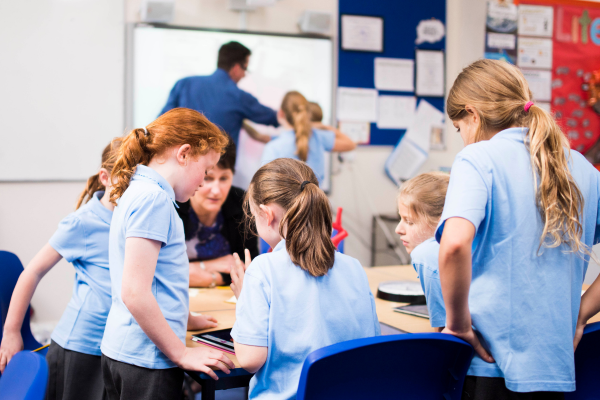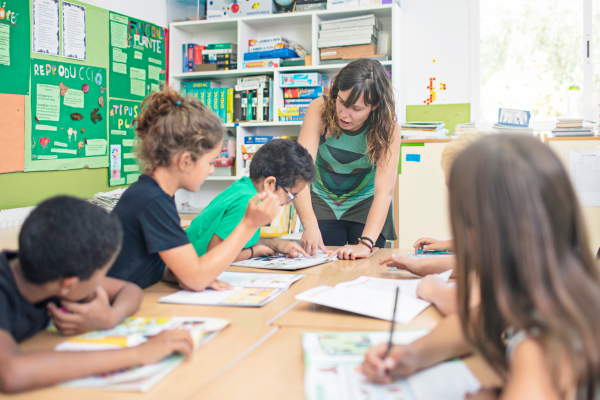Effective Strategies for Teaching Assistants: Nurturing Small Groups in the Classroom

Effective Strategies for Teaching Assistants: Nurturing Small Groups in the Classroom
Teaching Assistants (TAs) play a crucial role in fostering a positive learning environment, especially when working with small groups of children. This article aims to provide TAs with valuable insights and practical tips on various aspects of supporting small groups within a classroom setting.

Active Listening: Building Bridges of Understanding
Active listening is a foundational skill for any Teaching Assistant. By truly tuning in to what pupils are saying, TAs can create an environment where children feel heard and valued.
- Make eye contact, nod in affirmation and respond appropriately to demonstrate that you are engaged
- Avoid interrupting and instead, allow pupils to express themselves fully before offering guidance
This not only strengthens your connection with the students but also sets an example for respectful communication.

Creating Rapport with Others: Fostering a Positive Classroom Dynamic
Building rapport is essential for creating a positive and inclusive classroom environment.
- Take the time to learn each student's name, interests and strengths
- Greet them warmly and show genuine interest in their lives. This personal touch helps establish trust and makes students more receptive to your support
- Use positive reinforcement, praise and encouragement to reinforce good behaviour and effort
A supportive and friendly rapport contributes significantly to a positive classroom dynamic, promoting an atmosphere conducive to learning.

Motivating Pupils: Igniting the Spark for Learning
Motivation is the key to unlocking a child's potential. As a TA, find creative ways to inspire and encourage students within your small group.
- Recognise and celebrate their achievements, both big and small, to boost their confidence
- Identify their interests and incorporate them into lessons to make learning more engaging
- Set achievable goals and provide constructive feedback, emphasising the progress made
By instilling a sense of accomplishment, you empower students to take an active role in their learning journey.

Practical Ideas for Group Discussions: Fostering Collaboration and Critical Thinking
Effective group discussions are a powerful tool for enhancing learning outcomes.
- Encourage open communication and respectful exchanges of ideas within your small group
- Pose thought-provoking questions that stimulate critical thinking and encourage students to express their opinions
- Create a safe space where every voice is heard, fostering a sense of belonging
- Rotate leadership roles within the group to develop teamwork and responsibility
- Utilise visual aids, props or multimedia resources to make discussions more dynamic and engaging

Delivering Small Group Interventions: Tailoring Support to Individual Needs
Small group interventions provide a targeted approach to addressing the diverse needs of students.
- Identify the specific learning objectives for your group and tailor your interventions accordingly
- Utilise differentiated instruction to cater to individual learning styles, ensuring that every student receives the support they require
- Monitor progress regularly and adjust your approach as needed
- Collaborate with the classroom teacher to align interventions with the overall curriculum
Effective communication and coordination are key to maximising the impact of small group interventions.

As a Teaching Assistant working with small groups, your role is pivotal in shaping the educational experience for each student. By actively listening, creating rapport, motivating pupils, facilitating engaging discussions and delivering tailored interventions, you contribute significantly to their academic and personal development.
Embrace these best practices and you'll not only support your small group effectively but also contribute to the overall positive atmosphere in the classroom. Your dedication and commitment are invaluable in creating a nurturing learning environment for all students.
If you would like to learn more best practice and become more confident in your role, we recommend that you apply for our Teaching Assistant Level 3 Apprenticeship programme. Find out more information below and speak to your school before applying.
Looking for more information?
If you would like any more information on our Teaching Assistant Level 3 apprenticeship, get in contact with us:
Email: enquiries@bestpracticenet.co.uk
Tel: +44 (0) 117 920 9200 (8.30am-5.30pm, Mon-Fri)


